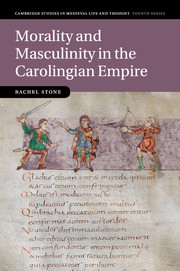
-
Select format
-
- Publisher:
- Cambridge University Press
- Publication date:
- November 2011
- October 2011
- ISBN:
- 9781139017473
- 9781107006744
- 9781107531994
- Dimensions:
- (228 x 152 mm)
- Weight & Pages:
- 0.8kg, 420 Pages
- Dimensions:
- (229 x 152 mm)
- Weight & Pages:
- 0.62kg, 420 Pages
You may already have access via personal or institutional login
Book description
What did it mean to be a Frankish nobleman in an age of reform? How could Carolingian lay nobles maintain their masculinity and their social position, while adhering to new and stricter moral demands by reformers concerning behaviour in war, sexual conduct and the correct use of power? This book explores the complex interaction between Christian moral ideals and social realities, and between religious reformers and the lay political elite they addressed. It uses the numerous texts addressed to a lay audience (including lay mirrors, secular poetry, political polemic, historical writings and legislation) to examine how biblical and patristic moral ideas were reshaped to become compatible with the realities of noble life in the Carolingian empire. This innovative analysis of Carolingian moral norms demonstrates how gender interacted with political and religious thought to create a distinctive Frankish elite culture, presenting a new picture of early medieval masculinity.
Reviews
'It is a welcome addition to a field of scholarship that rarely discusses the Frankish Empire, preferring instead either to end studies in late antiquity or to begin with the Gregorian reforms. Stone’s monograph is particularly impressive in its ability to reconstruct a general sense of prevailing cultural attitudes from diverse sources without falling into the trap of simplifying and harmonizing them. Moreover, she successfully integrates her investigation into both moral attitudes and questions of masculinity in such a manner that the two potentially divergent topics enrich one another, rather than cause a lack of focus. Stone’s conclusions are as insightful as they are reasonable … Scholars working on a variety of subjects will find the work a useful read, while specialists will appreciate the reappraisal of existing theories and the development of original points of interest.'
Erin Thomas Dailey Source: German History
'There are many thought-provoking insights and new arguments to be found in Stone’s ambitious book. All scholars of Carolingian Europe, the medieval nobility, and medieval masculinity should read it.'
Eric J. Goldberg Source: Early Medieval Europe
Contents
Metrics
Altmetric attention score
Full text views
Full text views help Loading metrics...
Loading metrics...
* Views captured on Cambridge Core between #date#. This data will be updated every 24 hours.
Usage data cannot currently be displayed.
Accessibility standard: Unknown
Why this information is here
This section outlines the accessibility features of this content - including support for screen readers, full keyboard navigation and high-contrast display options. This may not be relevant for you.
Accessibility Information
Accessibility compliance for the PDF of this book is currently unknown and may be updated in the future.


